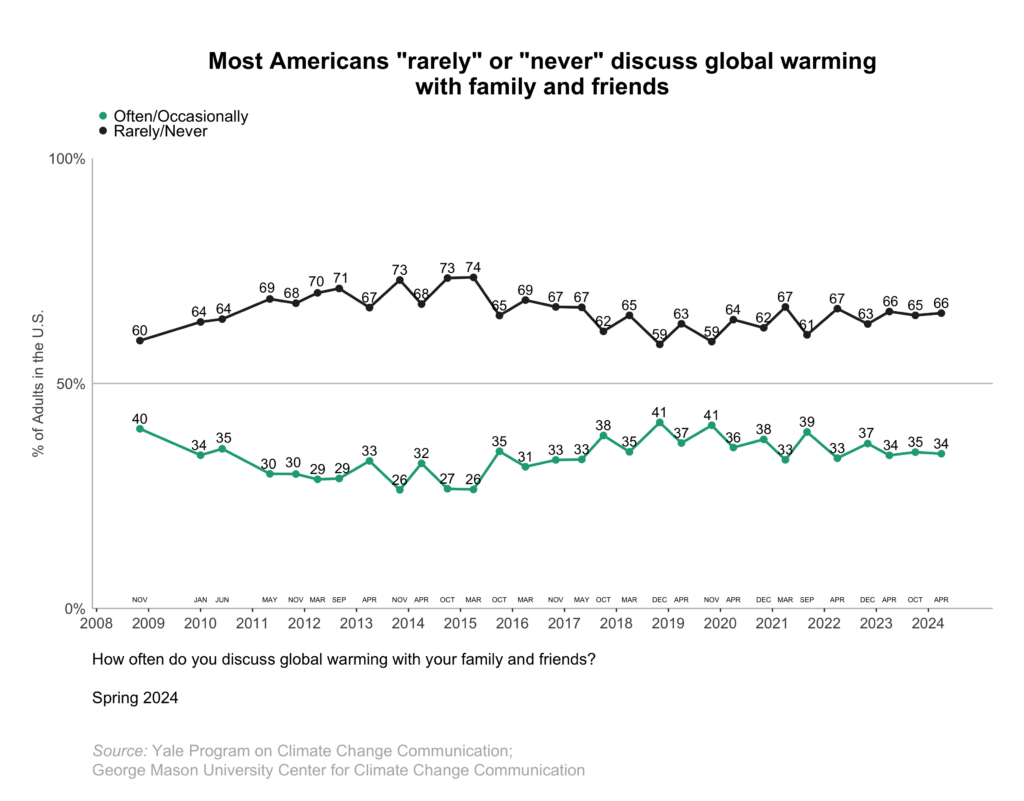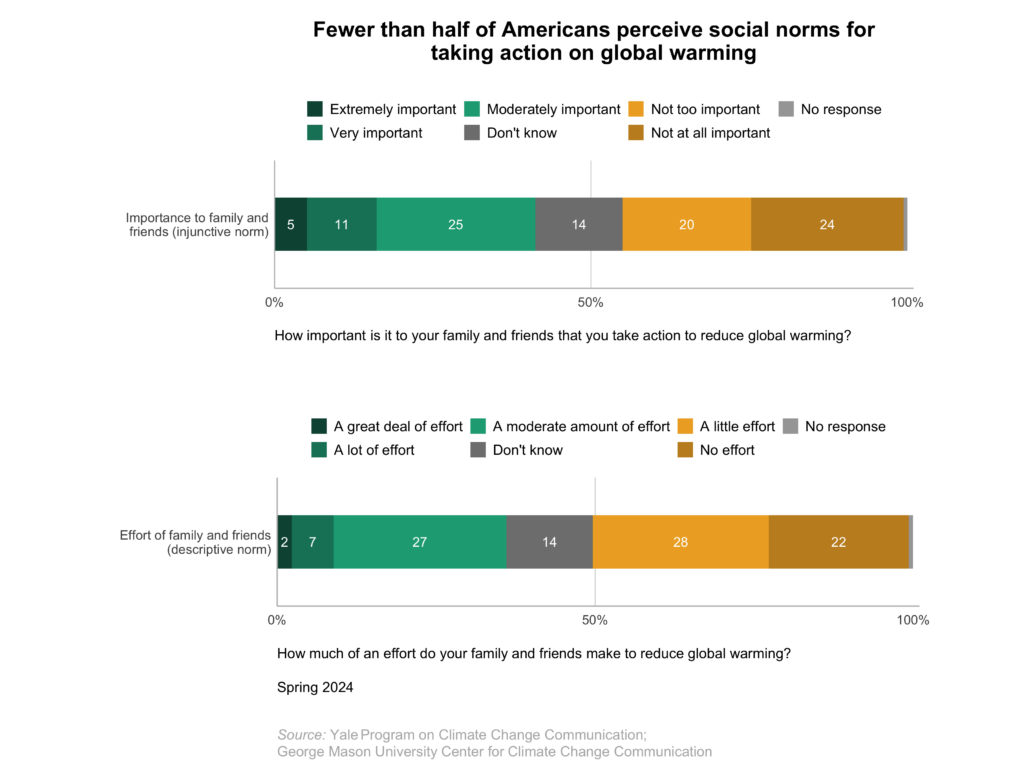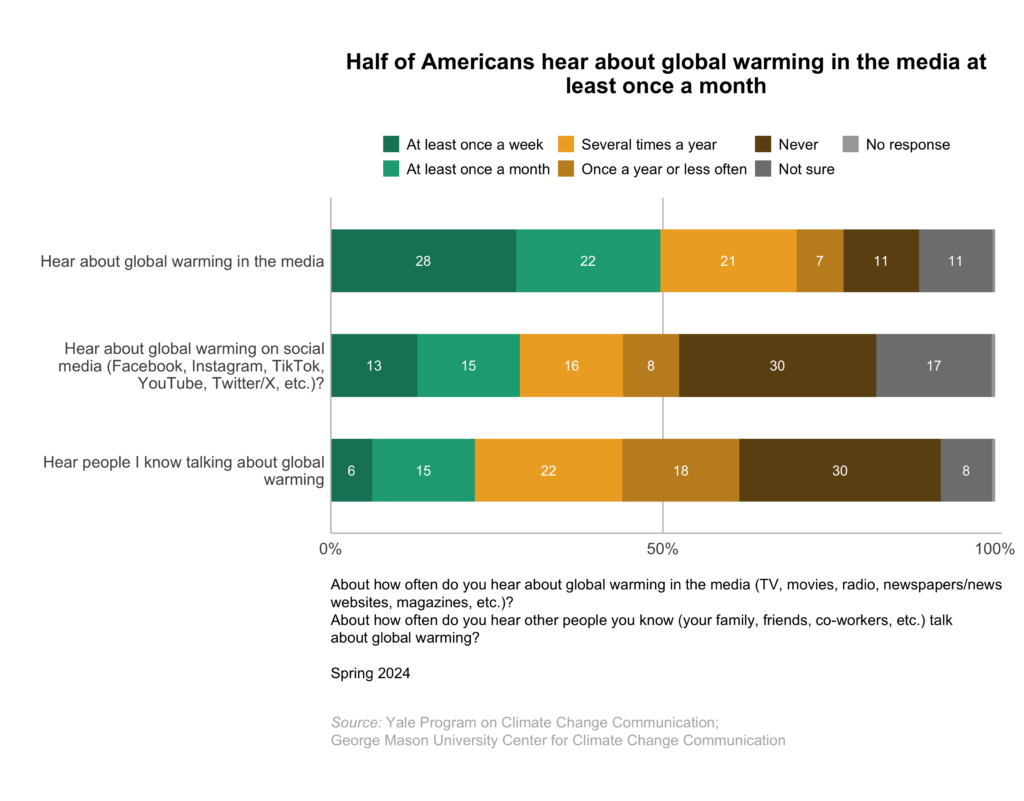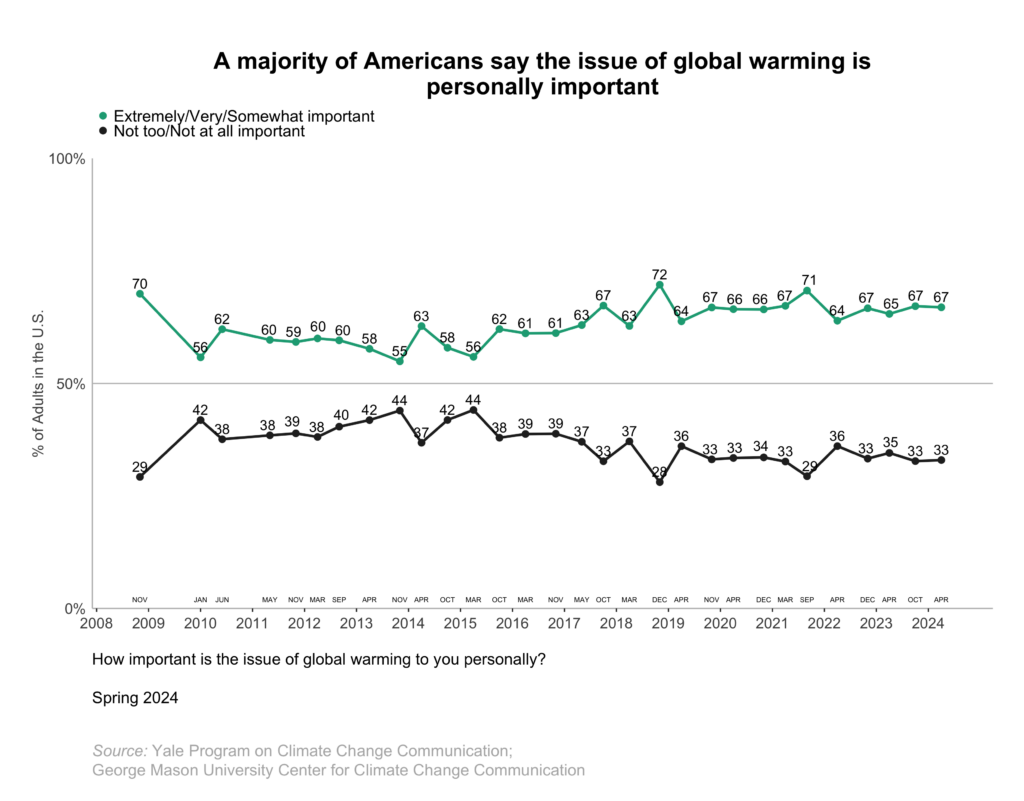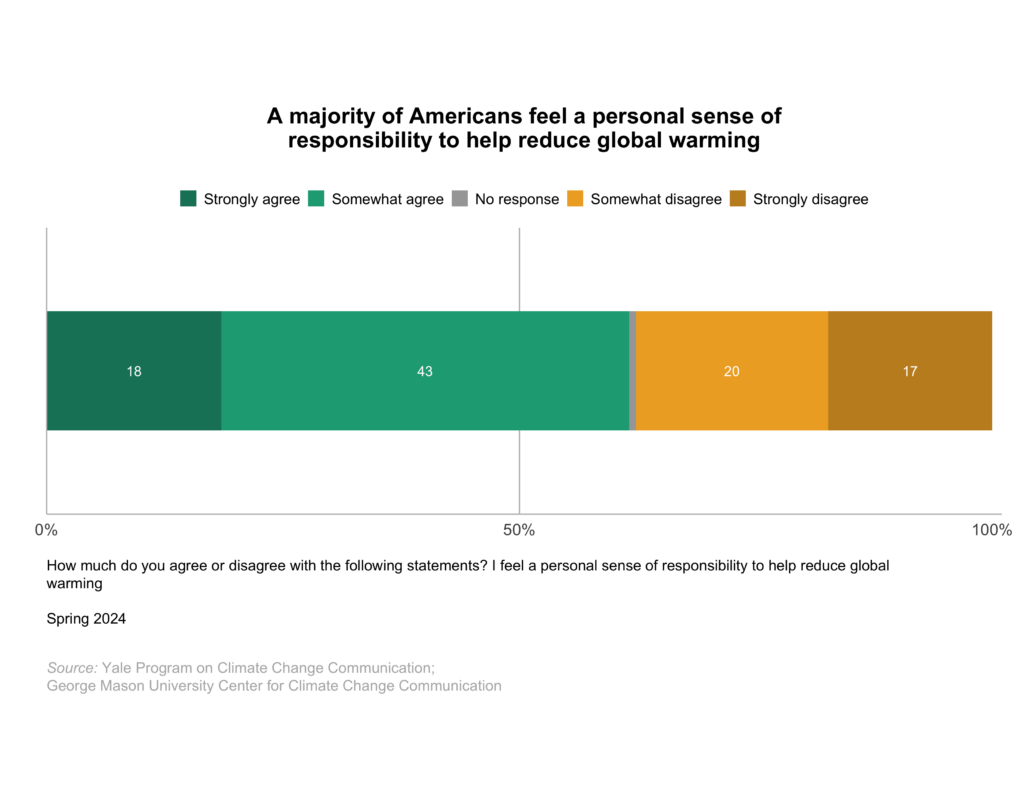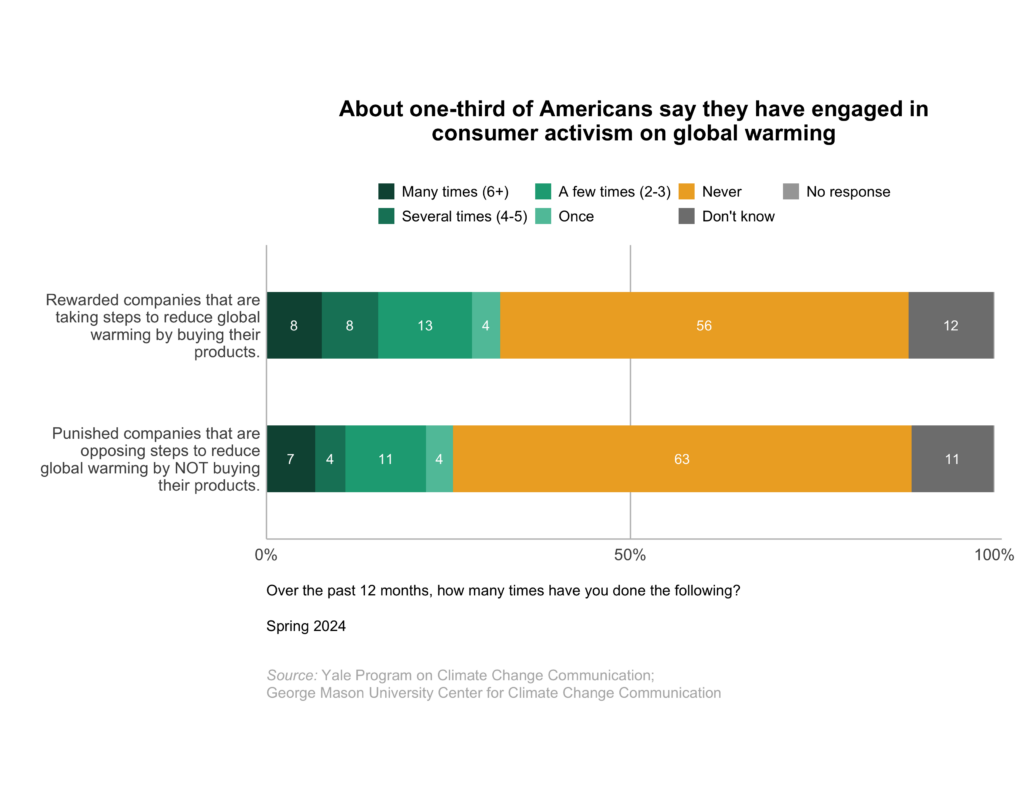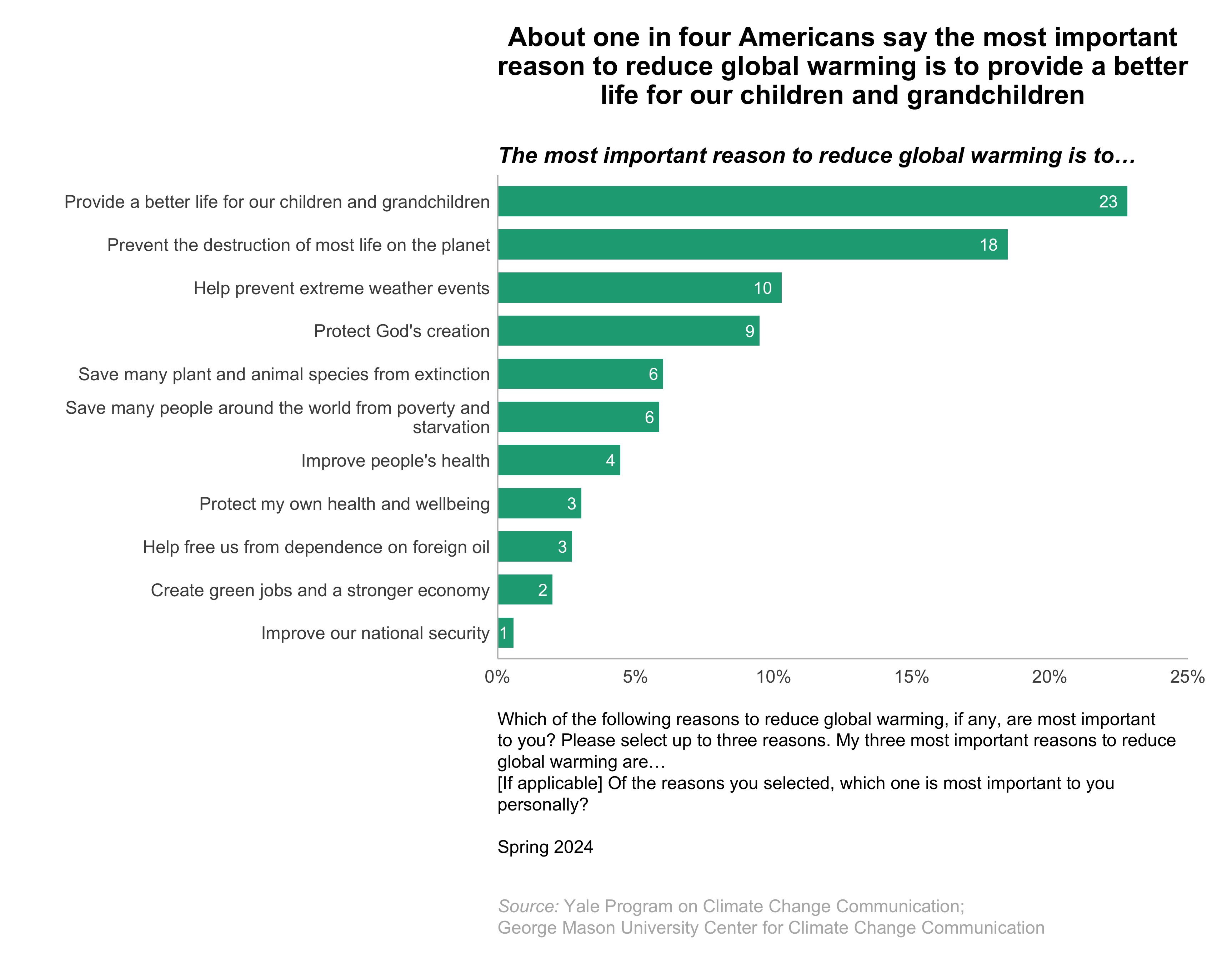Report · Jul 16, 2024
Climate Change in the American Mind: Beliefs & Attitudes, Spring 2024
By Anthony Leiserowitz, Edward Maibach, Seth Rosenthal, John Kotcher, Emily Goddard, Jennifer Carman, Matthew Ballew, Marija Verner, Teresa Myers, Jennifer Marlon, Sanguk Lee, Matthew Goldberg, Nicholas Badullovich and Kathryn Thier
Filed under: Beliefs & Attitudes, Climate Impacts and Behaviors & Actions
4. Personal and Social Engagement with Global Warming
4.1. Most Americans “rarely” or “never” discuss global warming with family and friends.
Two-thirds of Americans (66%) say they either “rarely” (33%) or “never” (33%) discuss global warming with family and friends (refer to data tables, p. 72), while 34% say they discuss global warming either “occasionally” (29%) or “often” (6%).
4.2. Fewer than half of Americans perceive social norms for taking action on global warming.
Social science research has shown that two types of social norms can have a powerful influence on people’s behavior: injunctive norms (the belief that friends and family expect you to behave in a given way) and descriptive norms (the belief that friends and family are themselves behaving in that way).Schultz, P. W., Nolan, J. M., Cialdini, R. B., Goldstein, N. J., & Griskevicius, V. (2007). The constructive, destructive, and reconstructive power of social norms. Psychological Science, 18(5), 429-434. doi:10.1111/j.1467-9280.2007.01917.x
About four in ten Americans (41%) perceive an injunctive norm, saying it is either “extremely” (5%), “very” (11%), or “moderately” (25%) important to their family and friends that they take action to reduce global warming. Similarly, 36% perceive a descriptive norm, saying their family and friends make either “a great deal of effort” (2%), “a lot of effort” (7%), or “a moderate amount of effort” (27%) to reduce global warming.
4.3. Half of Americans hear about global warming in the media at least once a month; fewer hear about it on social media or hear people they know talking about it at least once a month.
Half of Americans (50%) say they hear about global warming in the media once a month or more often, while 39% say they hear about global warming in the media several times a year or less often, including 11% who say they never hear about global warming in the media.
In contrast, only 28% of Americans say they hear about global warming on social media once a month or more often, while 54% say they do so several times a year or less often, including 30% who say they never hear about global warming on social media. Similarly, only 22% of Americans say they hear people they know talk about global warming once a month or more often, while 70% say they do so several times a year or less often, including 30% who say they never hear people they know talk about global warming.
4.4. A majority of Americans say the issue of global warming is personally important.
Two in three Americans (67%) say the issue of global warming is either “extremely” (15%), “very” (20%), or “somewhat” (31%) important to them personally (refer to data tables, p. 78). One in three (33%) say global warming is either “not too” (17%) or “not at all” (16%) personally important.
4.5. A majority of Americans feel a personal sense of responsibility to help reduce global warming.
A majority of Americans (62%) agree either “strongly” (18%) or “somewhat” (43%) that they feel a personal sense of responsibility to help reduce global warming.
4.6. About one-third of Americans say they have engaged in consumer activism on global warming.
About one-third of Americans (32%) say that at least “once” over the past 12 months, they have rewarded companies that are taking steps to reduce global warming by buying their products. About one quarter of Americans (26%) say that at least “once” over the past 12 months, they have punished companies that are opposing steps to reduce global warming by not buying their products.
4.7. About one in four Americans say the most important reason to reduce global warming is to provide a better life for our children and grandchildren.
About one in four Americans (23%) say providing a better life for our children and grandchildren is the most important reason, for them, to reduce global warming. One in ten or more say preventing the destruction of most life on the planet (18%) or helping prevent extreme weather events (10%) is the most important reason.
Fewer say their most important reason to reduce global warming is protecting God’s creation (9%), saving many plant and animal species from extinction (6%), saving many people around the world from poverty and starvation (6%), improving people’s health (4%), protecting their own health and well-being (3%), helping to free us from dependence on foreign oil (3%), creating green jobs and a stronger economy (2%), or improving national security (1%). About one in seven (14%; not pictured) either said this was not applicable because global warming isn’t happening (12%) or did not choose a reason (3%; refer to data tables, p. 96).
